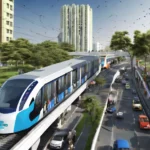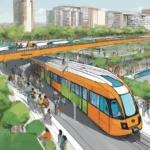Balancing Tradition and Progress in a Rapidly Evolving Landscape
Uttar Pradesh, the heartland of India, embodies a rich tapestry of tradition, culture, and philosophy. As the state undergoes profound economic, social, and technological transformations, its diverse communities face the challenge of adapting to modern realities while preserving their unique heritage. The philosophical perspectives ingrained in its culture, from religious doctrines to social norms, significantly influence how individuals and communities navigate change. This interplay of tradition and adaptation raises a vital question: How do these philosophies shape Uttar Pradesh’s response to the demands of modernization?
Philosophical Foundations Guiding Change
1. Tradition and Continuity
- Hindu Philosophy: Central to Uttar Pradesh’s ethos, Hinduism emphasizes the cyclical nature of time (kalachakra) and the importance of dharma (duty). These beliefs encourage individuals to adapt to change while remaining rooted in their roles and responsibilities.
- Example: Festivals like Kumbh Mela, a centuries-old tradition, now incorporate modern logistics and digital technologies, blending continuity with innovation.
- Islamic Teachings: With a significant Muslim population, the philosophy of ijtihad (independent reasoning) allows for adaptation to new contexts without compromising core values.
- Example: In urban centers like Lucknow, Islamic institutions are integrating modern education into madrassas, teaching STEM subjects alongside traditional Islamic studies.
2. Community-Centric Adaptation
- In rural Uttar Pradesh, village panchayats and local governance systems rely on collective decision-making, reflecting the principle of samajik samriddhi (social prosperity).
- Example: In regions like Bundelkhand, traditional water conservation practices, such as johads (water tanks), are being revived to address modern challenges like drought, demonstrating the adaptive resilience of local communities.
Modernization and the Challenges of Adaptation
1. Urbanization and Individualism
- Shift in Values: Urban centers like Noida and Ghaziabad, driven by industrial and IT growth, increasingly embrace philosophies of individualism and consumerism, often clashing with traditional community-oriented values.
- Impact: The migration of rural youth to cities for better opportunities leads to a dilution of traditional family structures, creating generational and cultural divides.
2. Technological Transformation
- Adoption vs. Resistance: While cities rapidly adopt digital governance, e-commerce, and telemedicine, rural areas often struggle with the digital divide.
- Example: The state’s Digi Shakti Mission, aimed at improving digital literacy, has enabled over 50 lakh youthto access technology, but its penetration in remote areas remains limited.
3. Gender and Social Change
- Evolving Roles: Modern education and employment opportunities are challenging traditional gender roles, particularly in urban and semi-urban areas.
- Resistance: In conservative pockets, such changes are often met with resistance, rooted in patriarchal norms and a fear of eroding cultural identity.
- Example: Initiatives like Mission Shakti, promoting women’s empowerment, reflect an ongoing philosophical shift toward gender equity.
Philosophical Tensions in Navigating Change
1. Preservation vs. Progress
- Many communities in Uttar Pradesh view modernization as a threat to their cultural heritage.
- Example: The construction of highways and industrial zones, while driving economic growth, often disrupts traditional lifestyles and raises ethical questions about displacement and environmental degradation.
2. Equality vs. Hierarchy
- Caste hierarchies remain deeply ingrained, creating friction with democratic ideals of equality.
- Example: Political movements like those led by the Bahujan Samaj Party (BSP) challenge caste-based inequalities, promoting Ambedkarite philosophy, which advocates for social justice and reform.
3. Spirituality vs. Materialism
- The increasing emphasis on consumerism and economic success often clashes with the state’s deeply spiritual outlook.
- Example: Pilgrimage towns like Varanasi are adapting to tourism-driven economies while attempting to retain their spiritual sanctity.
Case Studies of Successful Adaptation
1. Green Energy Transition in Rural Areas
- Initiative: Solar microgrids in rural UP have empowered villages to achieve energy self-sufficiency, combining modern technology with traditional self-reliance.
- Impact: Programs under the Uttar Pradesh New and Renewable Energy Development Agency (UPNEDA)have installed over 2,500 solar projects in remote areas.
2. Education Reforms
- Example: The integration of digital tools in rural schools under the UP Shiksha Mission bridges traditional learning methods with modern technology, improving literacy and digital skills.
3. Agro-Ecological Practices
- Farmers in Western UP are adopting organic farming methods influenced by Gandhian philosophies of sustainability, reducing dependency on chemical fertilizers and aligning with global environmental goals.
Strategies for Harmonizing Tradition and Progress
1. Inclusive Development Policies
- Prioritize initiatives that address regional and social disparities, ensuring rural areas benefit equally from modernization.
2. Reviving Traditional Wisdom
- Leverage indigenous knowledge systems, such as water conservation and organic farming, to address contemporary challenges.
3. Education and Awareness
- Promote education that balances traditional values with modern knowledge, fostering a holistic understanding of progress.
4. Participatory Governance
- Strengthen platforms for community participation in policymaking to ensure local voices are included in decisions about development.
Conclusion: The Balance Between Change and Continuity
Uttar Pradesh stands at a critical juncture, where the philosophical tension between tradition and modernization shapes its trajectory. While the state’s diverse communities navigate these challenges, their ability to adapt reflects a blend of resilience and innovation.
By embracing inclusive policies, reviving traditional wisdom, and fostering a culture of dialogue, Uttar Pradesh can harmonize its rich heritage with the demands of a rapidly changing world, ensuring that progress respects and preserves its unique identity.



























